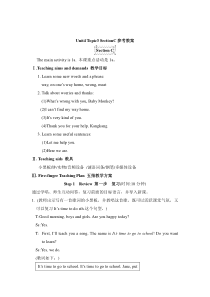 DOC
DOC
【文档说明】Unit 4 Topic 3《What animals do you like best》(SectionC)教案-七年级上册英语【仁爱版】.doc,共(8)页,40.500 KB,由小喜鸽上传
转载请保留链接:https://www.ichengzhen.cn/view-103993.html
以下为本文档部分文字说明:
Unit4Topic3SectionC参考教案SectionCThemainactivityis1a.本课重点活动是1a。Ⅰ.Teachingaimsanddemands教学目标1.Learnsomene
wwordsandaphrase:way,onone’swayhome,wrong,meat2.Talkaboutworriesandthanks:(1)What’swrongwithyou,BabyMonkey?(2)Ican’tfindmywayhome.(3)It’sverykindof
you.(4)Thankyouforyourhelp,Kangkang.3.Learnsomeusefulsentences:(1)Letmehelpyou.(2)Hereweare.Ⅱ.Teachingaids教具小黑板/钟/实物/音频设备/谜语词条/钢笔/多媒体设备
Ⅲ.Five-fingerTeachingPlan五指教学方案Step1Review第一步复习(时间:10分钟)通过学唱、师生互动问答,复习前面的目标语言,并导入新课。1.(教师出示写有一首歌词的小黑板,并教唱这首歌。既可以活跃课堂
气氛,又可以复习It’stimetodosth.这个句型。)T:Goodmorning,boysandgirls.Areyouhappytoday?Ss:Yes.T:First,I’llteachyouasong.ThenameisIt’stimetogotoschoo
l!Doyouwanttolearn?Ss:Yes,wedo.(歌词如下:)It’stimetogotoschool.It’stimetogotoschool.Jane,putyourshoeson,it’stime
togotoschool.It’stimetogohome.It’stimetogohome.Jane,putyourbagaway,it’stimetogohome.It’stimetogotobe
d.It’stimetogotobed.Jane,takeyourshoesoff,it’stimetogotobed.(教师解释歌词大意。)(教师教唱两遍。)2.(教师拿出一个时钟,引导学生复习时间和日常活动
的表达。)T:Isitnice?Now,let’slookattheclock.Pleasetellmethetimeandwhatyouusuallydoatthattime.Doyouunderstand?Ss:Yes.(教师把钟拨到6:50。)T:Whattimeisit?Ss:It’s
sixfifty./It’stentoseven.T:Whatdoyouusuallydo?S1:Iusuallygetup.T:Yes,it’stimetogetup.(教师把钟拨到12:00。)T:What’sthetime,please?S
s:It’stwelveo’clock.T:Whatdoyouusuallydo?S2:Iusuallyhavelunch.T:Yes,it’stimetohavelunch.(教师再拨几个时刻,让学生两人一组进行问答
。)T:Nowlookattheclock.Askandanswerinpairs.3.(学生两人一组谈论自己喜爱的动物,并说出喜欢的理由。)T:Hi,boysandgirls,wetalkedabouttimejustnow.Now,let’stalkaboutanimals.Workinp
airsandask:“Whatareyourfavoriteanimals?”and“Whydoyoulikethem?”(叫两组同学到讲台前表演。)Example:S3:S4,whatareyourfavoriteanimals?S4:Tigers.S3:W
hydoyoulikethem?S4:Becausetheyareverystrong.Howaboutyou?S3:Myfavoriteanimalsarepandas,becausetheyareverycute.4.(由复习前面的知识,导入本课的新词句。)T:Welldon
e.WeknowthatKangkangandhisfriendswenttothezoo.DoyourememberwhatanimalsKangkanglikesbest?Ss:Monkeys.T:Yeah,Kan
gkangmeetsBabyMonkeyonhiswayhomeintheafternoon.BabyMonkeyiscryingbecausehecan’tfindhiswayhome.(教师问一位女同学。)T:S5,ifyouc
an’tfindyourwayhome,willyoucry?(板书并要求学生掌握。)wayonone’swayhomeS5:Yes,Iwill.T:Ha-ha!Youarenotbraveenough.(教师解释brave。)Ifshecan’tfindherwa
yhome,canyouhelpher?S6,please.S6:Yes.T:Oh,it’sverykindofyou.(教师微笑。)(板书并教学该句的用法。)It’sverykindofyou.(教师做
找东西的动作,并露出焦虑的神情。)T:Ican’tfindmyEnglishbook.Whocanhelpme?Ss:Don’tworry.Wecanhelpyou.(学生在抢着说时,教师可以引导学生。)T:It’sverykindofyou.Youcanalsosaylikethis:Do
n’tworry.Letmehelpyou.(师生交换角色,让一学生做找东西的样子,引出句型What’swrongwithyou?)T:What’swrongwithyou,S7?S7:Ican’tfindmypen.T:D
on’tworry.Letmehelpyou.(教师帮助学生找钢笔。)Isitinyourbag?S7:No.T:Isithere?(教师打开学生的铅笔盒。)S7:No.T:Isitoverthere?(教
师环顾教室,然后指着事先放在教室后面的钢笔。)S7:Yes,itis.S8:Hereyouare.(教师示意另一个学生把钢笔递给他。)S7:Thankyou.T:Youcanalsosaylikethis:Thankyouforyourhelp.(板书,让学生猜测句
子的意思,然后解释,并要求学生掌握。)wrongWhat’swrongwithyou?overthereIt’soverthere.Thankyoufor+n./v.-ing.Thankyouforyourhelp
.(利用学生的思维定式,从他们的错误中引出新内容。)T:PleasetranslatemywordsintoChinese.Hereyouare.Ss:给你。T:Hereweare.Ss:(不假思索。)给我们。T:I
’mafraidyoucan’tsayitlikethis.Youshouldsay:我们到了。(板书并要求学生掌握。)Hereweare.Step2Presentation第二步呈现(时间:8分钟)通过学习1a,训练学生的阅读理
解能力。1.(教师提几个问题,让学生回答以明确课文大意,呈现课文场景。)T:Nowpleaselookatthetext.Whatcanyousee?Ss:WecanseeKangkangandsomeanimals.T:Whatanimalscanyousee?
Ss:Somemonkeys,atigerandalion.T:Oh.Howcareful!2.(让学生听1a录音,呈现目标语言。)T:Let’slistentothetapeandanswertheq
uestion:What’swrongwithBabyMonkey?(核对答案。)T:S1,please.S1:Hecan’tfindhiswayhome.3.(由学生整理出本段文章的关键词,找对一个奖励一分。)T:Howclever!Nowlet’s
readagainandfindoutthekeywordsofthepassage.Canyoutry?(教师板书关键词,学生核对答案。)What’swrong—can’tfind—mywayhome—Don’tworry
—notmyhome—Mr.Tiger’s—Mr.Lion—here—kindStep3Consolidation第三步巩固(时间:8分钟)通过表演对话,使学生加深理解并进一步巩固1a。1.(看第二步呈现在黑板上的关键词,五人一组表演1
a,完成1b。)T:Lookatthekeywordsontheblackboardandpracticethedialogingroupsoffive.Then,I’llasksomegroupstocometothefron
tandactout.(找几组表演。学生互评,选出表演最好的小组。)2.(让学生帮助2中的动物找到食物,师生核对答案。完成2。)T:Nicework.NowpleaselookatthepictureonPage98.Therearesomeanimalsandtheirfavorite
food.Doyouknowtheseanimals?Writedowntheirnamesandtalkabouttheirfavoritefoodingroups.Youcanbeginlikethis:Ithinkmeati
sthetiger’sfavoritefood.Ithinktherabbitlikes…(板书并要求学生掌握。)meatStep4Practice第四步练习(时间:12分钟)通过猜谜活动,提高学生的听力和理解能力,帮助学生提高写作水平。1.(猜谜语游
戏。教师准备一些谜语,让学生猜是什么动物。)T:Nowlet’sguesssomeriddles.Pleaseguesswhatanimalstheyareaccordingtomydescriptions.Ready?Go!(参考谜语如下:)T:Itis
verycute.Itoftenhelpspeopleandliveswithus.Iteatsmice.Fishisitsfavoritefood,whatisit?Ss:It’sacat.…2.(完成3。)(1)(写短文,为提高学生的写作水平打
下基础。)T:Goodjob!Boysandgirls,nowlet’sdosomewrittenwork.Eachofyoumustwriteapassagetodescribeyourfavoriteanimal.Theinformationinthetabl
emayhelpyou.Thentalkwithyourpartnerandlethim/herguesswhattheanimalis.Doyouunderstand?(教师解释。)Ss:Yes.T:OK.Let’sbegin.(2)(学生完成短文后,向同桌口头描述,让对方猜其最喜欢的动物,猜对
了举手示意,没有猜对则让全班同学来猜,答对了全班鼓掌,放松心情。)Step5Project第五步综合探究活动(时间:7分钟)创设情境,为学生提供实际运用英语的机会,提高学生的综合语言运用能力。1.(假如你在放学回家途中遇到一位迷路的小女
孩,然后你帮助她,在寻找她家的途中你们遇到了小女孩的邻居杨阿姨,最后小女孩找到了家。根据这些提示,写一篇与课文1a类似的对话。)T:Supposeyoumeetagirlonyourwayhome,andshecan’tfindherwayhome.T
henyouhelpher.Ontheway,youmeetthegirl’sneighbour(教师解释:“邻居”。)AuntYang.Atlast,thegirlfindsherhome.Pleasewriteasimi
lardialogaccordingto1a.Example:(假设你叫雷飞。)(LeiFeimeetsagirlonhiswayhome.)Lei:What’swrongwithyou?Girl:Ican’tfindmywayhome.Lei:Don’tworry.Letmehelpyo
u.Girl:Thankyou.Lei:Whosehomeisthis?Girl:Idon’tknow.It’snotmyhome.Lei:Isthisyourhome?Girl:No,itisn’t.(TheymeetAuntYang.)AuntYang:Oh,××,whyareyouher
e?Girl:Ican’tfindmywayhome,AuntYang.Lei:Excuseme,AuntYang,where’sherhome?AuntYang:It’soverthere,thewhitehouse.Lei:Overthere?Oh,thankyou.(Theyfi
ndthegirl’shome.)Lei:Hereweare.Thisisyourhome.Girl’smother:Oh,mydeardaughter.Girl:Oh,Mom!Girl’smother:It’sverykindofyou.What’s
yourname?Lei:I’mLeiFei.Girl’smother:Thankyouforyourhelp.LeiFei:Notatall.Goodbye.Girl’smother:Bye.(检查了学生的写作情况后,教师可用多媒体设备展示范文。)2.Homework:(1)2008年奥运会结
束后,许多外国游客意犹未尽,他们还想在中国玩上几天。假如有一天,一名英国游客在大街上迷了路。请结合本课1a的内容,帮他(她)找到他(她)的住处,并将这个对话写在作业本上。(2)背诵本课的目标语言。板书设计:Wewanttogotothezoo.SectionCKangkangmeetsBabyM
onkeyonhiswayhomeintheafternoon.What’swrongwithyou?Ican’tfindmywayhome.Don’tworry.Letmehelpyou.Herewea
re.It’sverykindofyou.Thankyoufor+n./v.-ing.
 辽公网安备 21102102000191号
辽公网安备 21102102000191号
 营业执照
营业执照